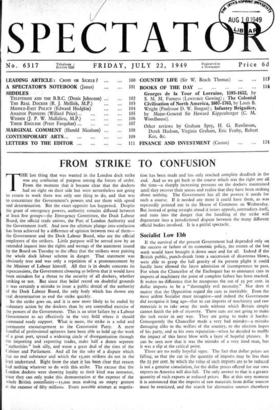FROM STRIKE TO CONFUSION T HE last thing that was wanted
in the London dock strike was any confusion of purpose among the forces of order. From the moment that it became clear that the dockers had no right on their side but were nevertheless not going to return to work there was only one thing to do, and that was to concentrate the Government's powers and use them with speed and determination. But the exact opposite has happened. Despite the grant of emergency powers, authority remains diffused between at least five groups—the Emergency Committee, the Dock Labour Board, the official trade unions, the Port of London Authority and the Government itself. And now the ultimate plunge into confusion has been achieved by a difference of opinion between two of them— the Government and the Dock Labour Board, who are the official employers of the strikers. Little purpose will be served now by an extended inquest into the rights and wrongs of the statement issued by the Board on Tuesday to the effect that the strikers were putting the whole dock labour scheme in danger. That statement was obviously true and was only a repetition of a pronouncement by the Minister of Labour himself. All that is in doubt concerns its repercussions, the Government choosing to believe, that it would have been mistaken for a threat to the security of all dockers, whether striking or not. But since that belief rested on doubtful grounds it was certainly a mistake to issue a public denial of the authority of the Dock Labour Board, the only body which has shown any real determination to end the strike quickly.
So the strike goes on, and it is now more likely to be ended by voluntary action by the dockers than by any controlled exercise of the powers of the Government. This is an utter failure by a Labour Government to act effectively in the very field where it should command ready support. What is more, the strike is a solid and permanent encouragement to the Communist Party. A mere handful of professional agitators have been able to hold up the work of a great port, spread a widening circle of disorganisation through the importing and exporting trades, make half a dozen separate "authorities" look silly, and waste a great deal of the time of the Cabinet and Parliament. And all for the sake of a dispute which has no real substance and which the 15,000 strikers do not in the least understand. Right from the start it has been clear that reason had nothing whatever to do with this strike. The excuse that the London dockers were showing loyalty to their kind was nonsense, since they can only make this demonstration at the expense of the whole British cortuntnity-15,000 men making an empty gesture at the expense of fifty millions. Every possible attempt at negotia- tion has been made and has only reached complete deadlock in the end. And so we get back to the course which was the right one all the time—a sharply increasing pressure on the dockers maintained until they recover their senses and realise that they have been striking about nothing. The Government has all the powers it needs for such a course. If it needed any more it could have them, as was repeatedly pointed out in the House of Commons on Wednesday. But instead of going straight ahead it issues appeals, contradicts itself, and runs into the danger that the handling of the strike will degenerate into a jurisdictional dispute between the many different official bodies involved. It is a pitiful spectacle.


































